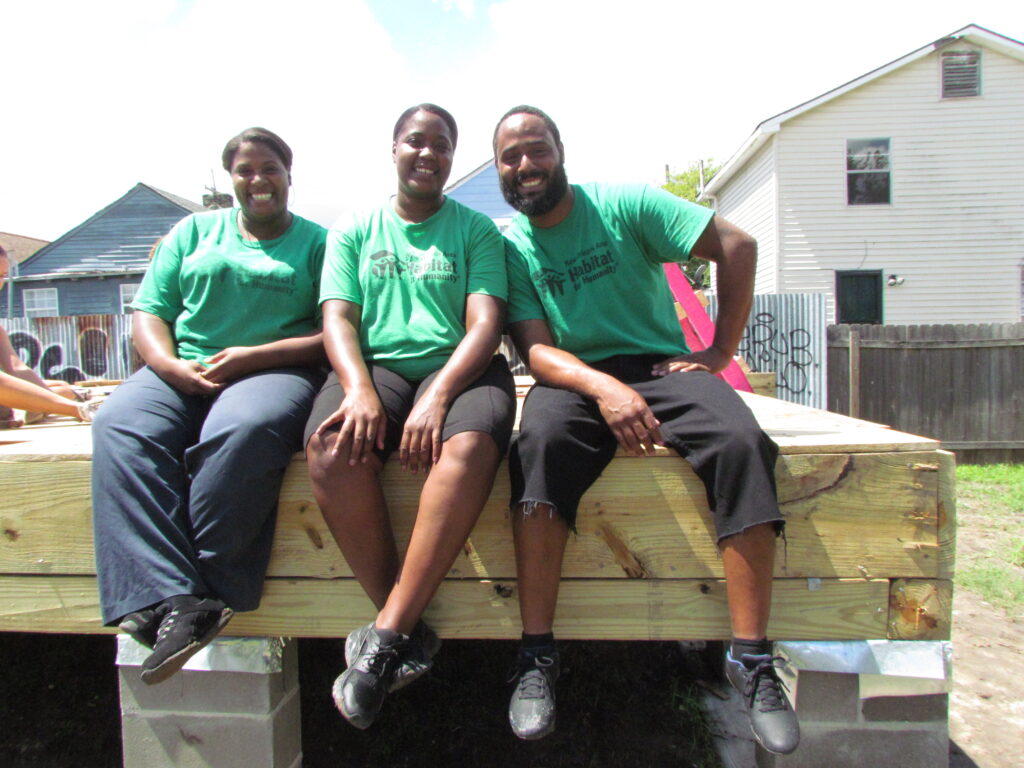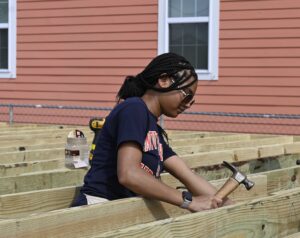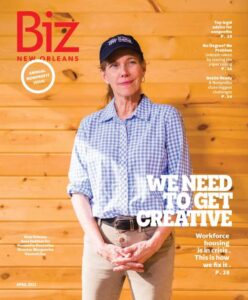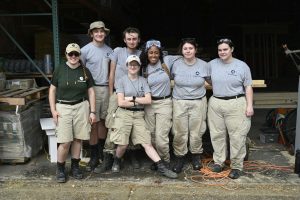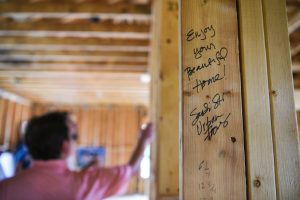Three siblings from the Williams family have now joined NOAHH’s homeownership program. Their story of giving back to their community, supporting one another, and persevering through the greatest obstacles is both remarkable and yet very familiar—compassion and hard work is what motivates partner families to build better futures for themselves, their children, and their communities:
Their father taught them to give back.
Growing up in a house with seven children, NOAHH homebuyers and twin sisters Shanell and Shantel Williams and their brother Ernest Williams lived in a small shotgun house where they shared a room with two other brothers and two children their parents had taken in. The limited space meant they had to be creative about sleeping quarters. At times, one of their siblings would use a storage compartment as a bed. By the age of 16, each of them found a job so they could help support their family, and every year, their father would take them to bring food and clothing to the homeless.
“It was just a small table underneath the bridge,” Shantel said. “Now when we do it, we have a trailer. Tables, chairs, clothes, personal hygiene items. It started just me and my dad, but then the family wanted to do it. It got bigger.”

When their father died, the tradition paused for a few years until a friend of Shantel asked for help. Supporting her friend reawakened the need to give back, and within a few years, her siblings rejoined her in the work. Growing up knowing how hard Christmas could be for low-income families, the Williams siblings decided to start a toy drive.
“Five kids living in the St. Thomas Project, we didn’t have everything,” Shanell said. “Even though we had two parents in the household, when ends couldn’t meet, we’d have to cut back. And we had maybe one toy a piece at Christmas.”
Neighbors, friends, and family all support the toy drive, but the bulk of it is the Williams siblings. They collect all year to prepare for the holidays.
“I said to Ernest, ‘I need the trailer, because it ain’t going to fit in my car no more,’” said Shantel. “He had to lock the trailer door because it was so full it couldn’t close.”
“The best moments are the looks on the kids’ faces and their families’ faces,” Shanell said.
As single parents in the Habitat program, it isn’t always easy, but the Williams family supports each other. When Shanell started the program, Shantel would take care of her children while her sister did her sweat equity hours; now that Shantel is in the program, Shanell is returning the favor. The family motivates each other.

“Being a single parent with two kids, you have to work hard,” said Shanell. “You have a job. You have kids. There’s a lot of stuff we can’t do. My 13 year old, he acts like he’s 20 something. He’d ask me if he could come help do hours. I’d say, ‘No, baby, you can’t come help. I wish you can, but you can help me with your grades. That goes toward hours.’”
Like Shanell’s son, Shantel’s daughter is too young to volunteer, but her daughter motivates her to work through the challenge—and inspired her to apply to the program. When Shantel’s family first visited Shanell’s new Habitat home, it was her daughter who convinced Shantel to apply.
“My daughter knows the green [partner family] shirt,” said Shantel. “She asks, ‘We’re going to get my house when I turn eight, right?’ I say, ‘Yes, when you turn eight, we’ll have our own house.’ This is what pushes me: her.”
As a child, Ernest suffered a seizure that left him unable to process what he reads. His sisters—and his own ingenuity—help him work around the limitations that come with it.
“I’ve never done drugs, none of that stuff, a day in my life, due to my sisters and brothers,” he said. “I call my sisters when I fill out forms. They feed it back to me in a way that I talk. [The partnership] would never have happened if it wasn’t for them.”
When he first applied to the program, he felt daunted by the paperwork. Though his case manager was there to support him, he still called his sisters for calming and guidance. He uses his phone’s search engine to help him understand written words by having it read out definitions to him. He’s become so proficient with it, few ever notice.
“There’s no such thing as ‘I can’t do it’ or ‘It’s not going to work’,” Ernest said. “There’s no such thing for me.”
All of the Williams siblings faced difficulties in finding affordable housing. Housing costs have risen 46% since Hurricane Katrina, meaning families have less to spend on other necessities. Childcare often costs as much as than rent. The Williams family struggled, but they had each other’s support.

“With the rent so high down here, there are some things you can’t pay for,” said Shanell. “You have to figure out food, lights, or rent.”
For the Williams siblings, having homes of their own means privacy and security. Growing up in a shotgun home meant living with open floor plans.
“It’s all worth it at the end,” said Shanell. “We lived in a shotgun house all our lives, so my kids didn’t always have their own room. It’s peace and quiet now.”
For Shanell, becoming a homeowner has meant financial stability. Her electric bill has dropped to only $118 a month. Her monthly payment is a third of what her brother pays for rent, and it includes mortgage principal, insurance, termite contract, and taxes. She saved so much her first few months in the home that she was able to take her sons on their first family vacation.
“My financial situation is so much better,” Shanell said. “I can take my kids on trips, and that’s something we never did because I didn’t have the money to do it. To see their faces on that trip to Florida was amazing. They said it was the best trip ever.”
For Shantel, it means having something permanent. “Just to have my own,” Shantel said. “To have a house in my name, and it’s mine and no one can take it. That’s what I’m looking forward to.”
“This helps so much,” said Shanell. “Believe it or not, I get up every Saturday morning singing. It’s a peace of mind where I don’t have to worry about how I’m going to pay this rent. I just wish my daddy could be here to see us accomplish this. To say ‘Okay, daddy, you worked so hard, and this is where we are at now.’”
